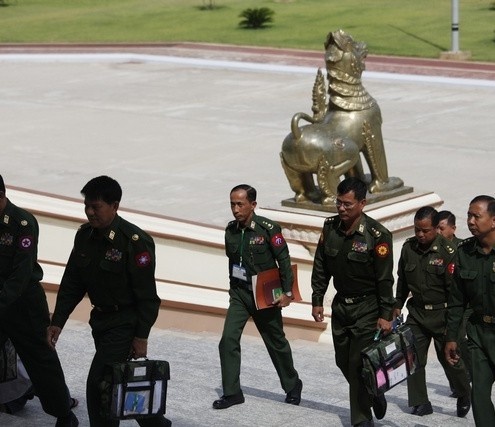Burma’s President Thein Sein announced plans on Wednesday to hold a meeting between representatives of the government, parliament, military and political parties.
Sai Lek, spokesperson for the Shan Nationalities League for Democracy (SNLD), said his party received an invitation from the president to join the meeting, which will take place at the presidential residence in Naypyidaw on 31 October. The meeting will focus on the peace process, national reconciliation and the country’s reform efforts.
“The invitation listed three subjects for discussion at the meeting: ensuring a smooth political transition; continuing the peace process; and national reconciliation negotiations. [SNLD] Chairman U Khun Htun Oo has been invited to attend the meeting on behalf of the party and in his capacity as a representative of the United Nationalities Alliance,” said Sai Lek.
The meeting is due to be attended by the following 14 individuals: President Thein Sein and his two vice-presidents; parliamentary speakers Shwe Mann and Khin Aung Myint; National League for Democracy Chairperson Aung San Suu Kyi; the military’s Commander-in-Chief Snr-Gen Min Aung Hlaing; Vice-Commander-in-Chief Gen Soe Win; Union Election Commission Chairman Tin Aye; SNLD Chairman Khun Htun Oo; Shan State Nationalities Democratic Party Chairman Sai Aik Pao (who will attend on behalf of an alliance of ethnic political parties called the Nationalities Brotherhood Federation); the National Democratic Force Chairman Khin Maung Swe (representing the Federal Democracy Alliance); Than Tin from the National Unity Party; and an as yet unnamed representative from the ruling Union Solidarity and Development Party.
[related]
Last year Suu Kyi called for a quadripartite meeting with the president, parliamentary speakers, the military chief and herself to discuss amending Burma’s 2008 Constitution.
“We think the president is offering a win-win solution to [Suu Kyi’s request] by not completely rejecting her demand for a four-party dialogue. At the same time, the meeting includes more parties while not strictly excluding the four institutions she requested,” said Sai Lek.
“Also, in my personal opinion, this meeting could be a good opportunity to talk about the peace process deadlock, hosted by U Aung Min’s Union Peacemaking Work Committee, and give the world the impression that Burma is moving forwards with its democratic transition in advance of US President Obama’s impending visit to Burma.”
In his monthly radio speech to the country on 1 October, Thein Sein said that a nationwide ceasefire agreement between the government and armed ethnic groups must be signed to “ensure stability, a successful 2015 election, and a smooth continuation of [Burma’s] political reforms.”



